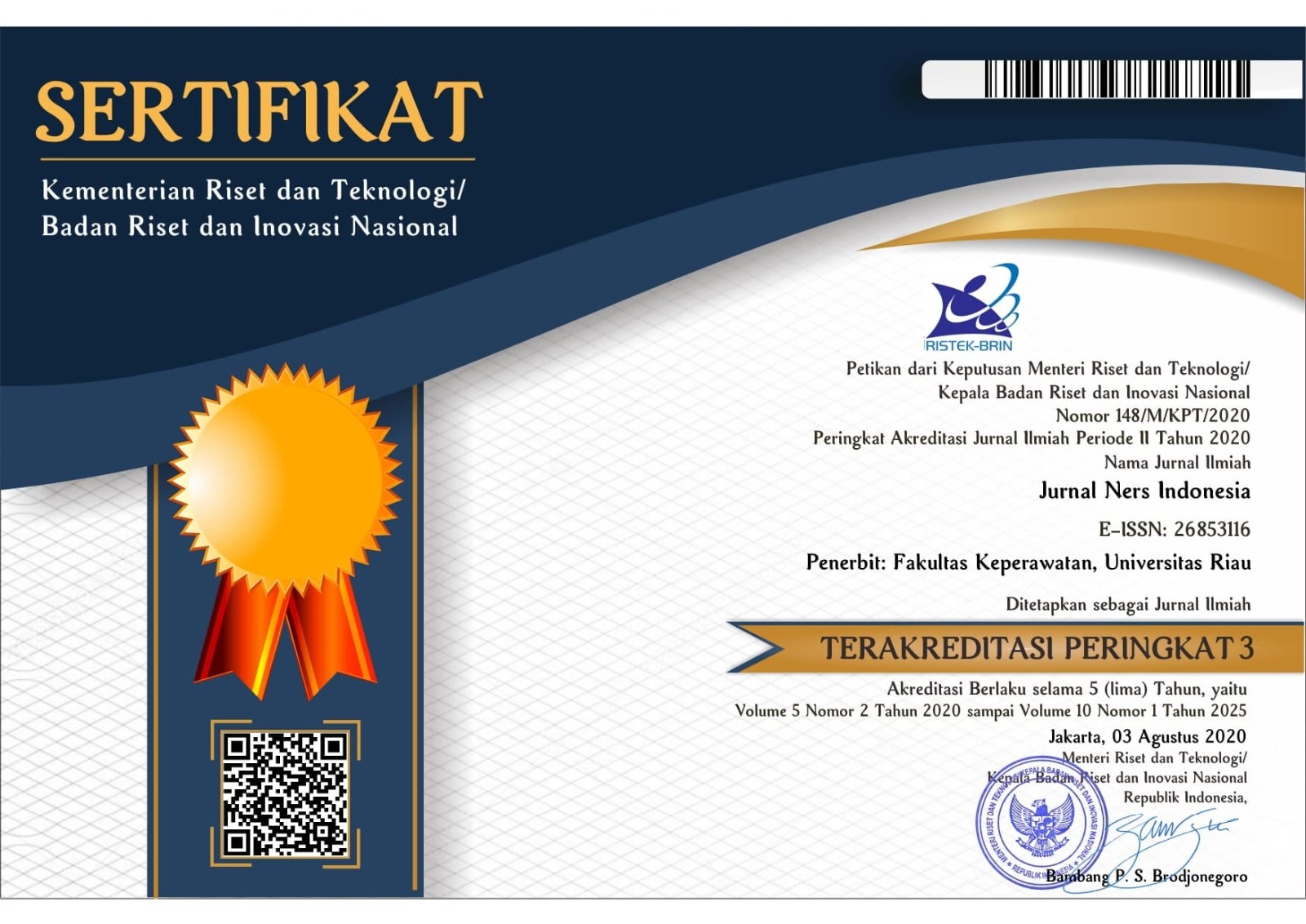PERSEPSI IBU TERHADAP GEJALA DEPRESI PADA PERIODE KEHAMILAN: STUDI KUALITATIF
DOI:
https://doi.org/10.31258/jni.13.2.158-168Abstract
Depresi dalam masa kehamilan merupakan masalah kesehatan mental yang paling sering dialami oleh ibu. Kondisi ini menyebabkan ibu kurang peduli dengan kesehatan kehamilannya yang berdampak negatif terhadap pertumbuhan janin, resiko persalinan prematur sehingga berat badan bayi lahir rendah dan bayi kurang responsive terhadap stimulus. Memahami secara kualitatif kondisi ibu hamil yang mengalami gejala depresi masih terbatas penelitiannya. Penelitian ini bertujuan mengeksplorasi persepsi ibu hamil terhadap gejala depresi. Metode penelitian kualitatif dengan pendekatan fenomenologi yang dilakukan di wilayah kerja Puskesmas Pekanbaru dengan jumlah partisipan 10 orang ibu hamil yang diambil secara purposive sampling yaitu pengambilan sampel dengan kriteria terdeteksi mengalami gejala depresi setelah mengisi lembar kuesioner Edinburgh Postnatatal/Perinatal Depression Scale (EPDS) dengan nilai minimal 7 (Mild depression). Data dikumpulkan dengan wawancara mendalam yang dianalisis menggunakan analisis tematik. Ditemukan tiga tema dari hasil analisis 1) Perubahan perilaku akibat suasana emosi yang tidak stabil, 2) Faktor internal dan eksternal menjadi penyebab perubahan suasana emosi, 3) Pengendalikan suasana emosi membutuhkan berbagai dukungan. Disarankan ibu hamil membuka diri mengungkapkan suasana hati kepada orang terdekat, mengikuti aktifitas yang disenangi untuk meningkatkan suasana hati positif dan adanya program layanan kesehatan psikologis bagi ibu hamil saat kunjungan antenatal care
References
Andriyani, S., Rahmi, U., Sulastri1, A., & Darmawan, D. (2021). Geografi Emosi Tentang COVID-19 pada Pelajar. The Indonesian Journal of Infectious Diseases, 7(1), 10. https://doi.org/10.32667/ijid.v7i1.117
Anindyajati, G., Ismail, R. I., Sylvia, H. D., Diatri, H., & Elvira, S. D. S. D. (2017). Antenatal depression and its determinant factors in urban community setting. Advance Science Letters, 23(4), 3439–3441. https://doi.org/https://doi.org/10.1166/asl.2017.9122
Annerangi, W., & Helda. (2013). Prevalensi dan determinan ansietas dan depresi antenatal di Puskesmas Kecamatan Pasar minggu tahun 2013. April.
Ashaba, S., Rukundo, G. Z., Beinempaka, F., Ntaro, M., & Leblanc, J. C. (2015). Maternal depression and malnutrition in children in southwest Uganda: A case control study. BMC Public Health, 15(1), 1–6. https://doi.org/10.1186/s12889-015-2644-y
Beeghly, M., Partridge, T., Tronick, E., Muzik, M., Rahimian Mashhadi, M., Boeve, J. L., Irwin, J. L., Badr, L. K. I., Bigelow, A. E., Beebe, B., Power, M., Stafford, A. L., Ewing, J., Egleson, A., & Kaminer, T. (2017). Associations Between Early Maternal Depressive Symptom Trajectories and Toddlers’ Felt Security At 18 Months: Are Boys and Girls At Differential Risk? Infant Mental Health Journal, 38(1), 53–67. https://doi.org/10.1002/imhj.21617
Brandon, A. R., Pitts, S., H.Denton, W., Stringer, A., & Evans, H. M. (2011). A history of the theory of prenatal attachment. Journal Prenatal Perinatal Psychological Health, 23(4).
Eastwood, J., Ogbo, F. A., Hendry, A., Noble, J., Page, A., & Years, E. (2017). The Impact of Antenatal Depression on Perinatal Outcomes in Australian Women. PLoS Medicine, 1–16. https://doi.org/10.1371/journal.pone.0169907
Fallon, V., Groves, R., Halford, J. C. G., Bennett, K. M., & Harrold, J. A. (2016). Postpartum Anxiety and Infant-Feeding Outcomes: A Systematic Review. Journal of Human Lactation, 32(4), 740–758. https://doi.org/10.1177/0890334416662241
Glover, V., & Capron, L. (2017). Prenatal parenting. Current Opinion in Psychology, 15, 66–70. https://doi.org/10.1016/j.copsyc.2017.02.007
Gondo, H. K. (2022). SKRININGEDINBURGH POSTNATAL DEPRESSION SCALE(EPDS) PADAPOST PARTUM BLUES. Jurnal Ilmiah Kedokteran Wijaya Kusuma, 1(2), 17–29.
Hadi, I., Wijayanti, F., Devianti, R., & Rosyanti, L. (2017). Gangguan Depresi Mayor (Mayor Depressive Disorder) Mini Review. Health Information : Jurnal Penelitian, 9(1), 25–40. https://doi.org/10.36990/hijp.v9i1.102
Hompes, T., Vrieze, E., Fieuws, S., Simons, A., Jaspers, L., Van Bussel, J., Schops, G., Gellens, E., Van Bree, R., Verhaeghe, J., Spitz, B., Demyttenaere, K., Allegaert, K., Van Den Bergh, B., & Claes, S. (2012). The influence of maternal cortisol and emotional state during pregnancy on fetal intrauterine growth. Pediatric Research, 72(3), 305–315. https://doi.org/10.1038/pr.2012.70
Humayun, A., Haider, I. I., Imran, N., Iqbal, H., & Humayun, N. (2013). Antenatal depression and its predictors in Lahore, Pakistan.. 19(4), 327–332.
Husaeni, L. (2017). Depresi Pada Remaja Yang Hamil Diluar Nikah. Universitas Gunadarma.
Husna, R. K. N., Wardanis, M., & Rahmi, J. (2018). Faktor Yang Berhubungan Dengan Kejadian Depresi Antenatal Pada Ibu Hamil Di Bidan Praktik Mandiri (Bpm) Kota Pekanbaru Tahun 2017. In Jurnal Proteksi Kesehatan (Vol. 6, Issue 1). https://doi.org/10.36929/jpk.v6i1.68
Ismail, R. I. (2002). Faktor resiko depresi prabersalin dan depresi pascabersalin: Minat khusus pada dukungan sosial dan kesesuaian hubungan suami istri. Universitas Indonesia.
Kawanishi, Y., Yoshioka, E., Saijo, Y., Itoh, T., Miyamoto, T., Sengoku, K., Ito, Y., Ito, S., Miyashita, C., Araki, A., Endo, T., Cho, K., Minakami, H., & Kishi, R. (2019). The relationship between prenatal psychological stress and placental abruption in Japan, the Japan Environment and Children’s Study (JECS). PLoS ONE, 14(7), 1–16. https://doi.org/10.1371/journal.pone.0219379
Kemenkes RI. (2016). Peran Keluarga Dukung Kesehatan Jiwa Masyarakat. 1–2.
Kementerian Kesehatan RI. (2015). Keputusan Menteri Kesehatan Republik Indonesia Nomor HK.02.02/MENKES/73/2015 tentang Pedoman Nasional PelayananKedokteran Jiwa.
Kurniawati, D. W., Anantanyu, S., & Suwarto. (2016). Prosiding Seminar Nasional Penyuluhan Pembangunan 2016. In Universitas Sebelas Maret (Vol. 53, Issue 9).
Laszlo, K. D., Liu, X. Q., Svensson, T., Wikstrom, A.-K., Li, J., Olsen, J., Obel, C., Vestergaard, M., & Cnattingius, S. (2013). Psychosocial stress related to the loss of a close relative the year before or during pregnancy and risk of preeclampsia. Hypertension, 62(1), 183–189. https://doi.org/10.1161/HYPERTENSIONAHA.111.00550
Mahmoodi, Z., Dolatian, M., Jalal, M., & Mirabzadeh, A. (2018). A path analysis of the effects of mental health and socio-personal factors on breastfeeding problems in infants aged less than six months. Evidence Based Care, 7(4), 38–45. https://doi.org/10.22038/ebcj.2017.26740.1620
Mayangsari, C., Redayani, P., & Diatri, H. (2016). Ungkapan Stres untuk Gejala Cemas dan Depresi pada Pasien di Puskesmas Gambir: Studi Kualitatif. Ikatan Dokter Indonesia, 66(10), 481–489.
Mccabe-beane, J. E., Segre, L. S., Perkhounkova, Y., Stuart, S., Hara, M. W. O., Segre, L. S., & Perkhounkova, Y. (2016). The identification of severity ranges for the Edinburgh Postnatal Depression Scale. 6838(March). https://doi.org/10.1080/02646838.2016.1141346
Misrawati, & Afiyanti, Y. (2020). Antenatal depression and its associated factors among pregnant women in Jakarta , Indonesia. Enfermería Clínica, 30, 96–101. https://doi.org/10.1016/j.enfcli.2020.07.020
O’Donnell, K. J., Glover, V., Jenkins, J., Browne, D., Ben-Shlomo, Y., Golding, J., & G.O’Connor, T. (2013). Prenatal maternal mood is associated with altered diurnal cortisol in adolescence. Psychoneuroendocrinology, 38(9), 1630–1638. https://doi.org/10.1016/j.psyneuen.2013.01.008.Prenatal
O’Donnell, K., O’Connor, T. G., & Glover, V. (2009). Prenatal stress and neurodevelopment of the child: Focus on the HPA axis and role of the placenta. Developmental Neuroscience, 31(4), 285–292. https://doi.org/10.1159/000216539
O’Hara, M. W., Wisner, K. L., Norman, & Asher, H. (2014). Best Practice & Research Clinical Obstetrics and Gynaecology Perinatal mental illness : Definition , description and aetiology. Best Practice & Research Clinical Obstetrics & Gynaecology, 28(1), 3–12. https://doi.org/10.1016/j.bpobgyn.2013.09.002
Radityo, W. E. (2020). Depresi dan Gangguan Tidur. Fakultas Kedokteran Universitas Udayana, 1–16.
Raharja, T., & Jusup, I. (2021). Pasien Depresi Dengan Gangguan Kepribadian Borderline Yang Mendapatkan Terapi Psikofarmaka Dan Psikoterapi Psikodinamik. Ilmiah Kesehatan Jiwa, 3(1), 1–12.
Savitri, E. N., Hayati, E. N., & Daryanti, M. S. (2022). Scoping review: layanan perinatal mental health oleh bidan di negara asean. Kesehatan Manarang, 8(2), 115–130.
Shridevi, & Anuchithra. (2014). Impact of Child Birth Preparation on Antenatal Depression. Asian Journal of Nursing Education and Research, 4(December), 436–442. https://www.indianjournals.com/ijor.aspx?target=ijor:ajner&volume=4&issue=4&article=010
Van Den Bergh, B. R. H., Mulder, E. J. H., Mennes, M., & Glover, V. (2005). Antenatal maternal anxiety and stress and the neurobehavioural development of the fetus and child: Links and possible mechanisms. A review. Neuroscience and Biobehavioral Reviews, 29(2), 237–258. https://doi.org/10.1016/j.neubiorev.2004.10.007
Van Niel, M. S., & Payne, J. L. (2020). Perinatal depression: A review. Cleveland Clinic Journal of Medicine, 87(5), 273–277. https://doi.org/10.3949/ccjm.87a.19054












